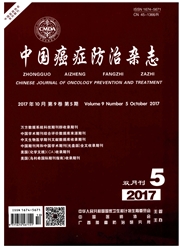

 中文摘要:
中文摘要:
目的:探讨CDKN1A基因的表达与鼻咽癌放射敏感性的关系。方法构建慢病毒表达载体LV-CDKN1A-RNAi并转染鼻咽癌放射抗拒性CNE-2R细胞,设转染LV-CDKN1A-RNAi慢病毒的CNE-2R细胞为实验组,转染阴性对照慢病毒的CNE-2R细胞为阴性对照组,未转染的CNE-2R细胞为空白对照组。用CCK-8法、细胞克隆形成实验及流式细胞术分别检测各组细胞增殖、放射敏感性及细胞周期的变化。结果成功构建了CDKN1A基因沉默的CNE-2R细胞,CCK-8法检测显示实验组CNE-2R细胞在照射6 Gy后生长受到抑制,且随时间延长其抑制作用更为明显。细胞克隆形成实验显示实验组CNE-2R细胞放射敏感性增强(放射增敏比为SER=1.24)。流式细胞术检测显示实验组与对照组细胞相比, G0/G1期和G2/M期细胞分布在X射线照射6 Gy前后明显改变(P约0.05)。结论 CDKN1A基因沉默能增强鼻咽癌放射抗拒性CNE-2R细胞的放射敏感性,CDKN1A基因的表达可能与鼻咽癌放射敏感性相关,有望成为鼻咽癌治疗的新靶点。
 英文摘要:
英文摘要:
Objective To investigate the relationship between the CDKN1A gene expression and the change of radiosensitivity of human nasopharyngeal carcinoma. Methods Lentiviralvector-mediated RNA interference(LV-CDKN1A-RNAi)targeting was constructed and transfected it to CNE-2R cells.CNE-2R cells transfected with LV-CDKN1A-RNAi were taken as experimental group,those transfectedwith control virus and without any treatment were taken as control group and blank group.The proliferation inhibitory rate was measured by CCK-8 assay.Colony formation assay was performed to determine the radiosensitizing effect.Cell cycle distribution was analyzed by flow cytometry. Results The stably silenced expression of CDKN1A CNE-2R cell line was established.CCK-8 assay showed that the growth of CNE-2R cell of the experimental group was inhibited after 6 Gy irradiating,which was closely related to growth time.The results of colony formation assay showed that the radiosensitivity of CNE-2R cell of the experimental group was more enhance(SER=1.24)than the other groups.Comparing with control group,cell cycle distribution showed that the cell distribution of G0/G1 and G2/M cycle in the experiment group was significantly changed before and after 6 Gy irradiating. Conclusions Silencing gene CDKN1A may enhance the radiosensitivity of CNE-2R cells of human nasopharyngeal carcinoma,which maybe used as a thera-peutic target for nasopharyngeal carcinoma.
 同期刊论文项目
同期刊论文项目
 同项目期刊论文
同项目期刊论文
 期刊信息
期刊信息
